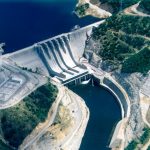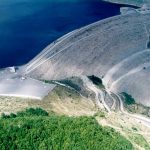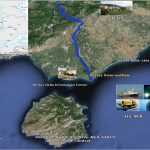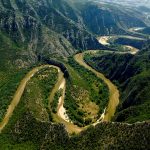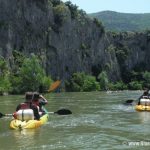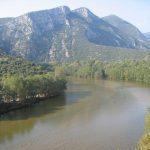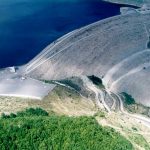The Nestos is a Southern Balkan highland river, which flows through Bulgaria (Mesta River) and Greece into the North Aegean Sea, forming an extensive delta mosaic of sand dunes, freshwater lakes and ponds, coastal lagoons and saltmarshes. It belongs to a class of river systems that play a critical role globally, globally delivering 46% of total suspended solids and 29% of total dissolved solids of riverine material to coastal seas.
The Nestos Supersite, located in the area of the delta, will comprise: a network of field meteorological; hydrological and biogeochemical observation stations; a network of instrumented hydrological boreholes; experimental laboratory facilities; research vessels; equipment for freshwater, coastal and oceanographic fieldwork; and state-of-the-art analytical facilities for biogeochemical, biological, hydrochemical, and hydrological research.
About 84% of the annual river sediment flux is trapped behind reservoirs. As a result, the deltaic areas are not expanding or have even started to decrease, with the seashore sediment balance severely affected and resulting erosion of the river mouth and adjacent coastline. Erosion impact on lagoon barrier spits has occasionally led to seaside over-wash and breaching, increasing salinity and disrupting natural ecological functioning.
The river basin has a low population density and contains relatively natural upland areas. Industrial point pollution is limited but intensive deforestation has led to excessive erosion and sedimentation. Reservoirs, flood protection schemes, canalisation and embankments initiated the erosion of the delta and caused a reduction of coastal marshlands. Groundwater exploitation from >2,000 shallow wells in the delta results in increased salinization of coastal aquifers.
The Supersite will facilitate research on: biogeochemistry processes and modelling; modelling of anthropogenic impact; testing of river-coastal sensor systems; fisheries and aquaculture in transitional environments; transfer of solid and solute material from land to sea; organic carbon dynamics; coastal aquifer seawater intrusion; and direct groundwater seepage to the sea. The research requires routine, robust and accurate water quality measurements, and an archive of well characterized solid and solute samples, particularly in sensitive and diverse ecological areas such as inland, transitional and coastal waters.
HCMR will provide state of the art hydrochemistry, organic and inorganic chemistry/ geochemistry, sedimentation, biological and microbiological laboratories. An integral part of the Supersite will be access to the oceanographic fleet and the full range of field equipment. FRI affords easy access to a variety of river, transitional and coastal habitats from land and sea. The Democritus University of Thrace (Department of Environmental Engineering) will provide access to scientific expertise and laboratory infrastructure. MANDVI will contribute four monitoring stations for water discharge and logistical support through the two information centres located in the Nestos Delta and Lake Vistonis. In addition, an existing network of meteorological and water quality monitoring stations will be expanded with new biogeochemical observation stations, automated field sampling stations, and instrumented boreholes for the study of land-sea underground exchange processes.

